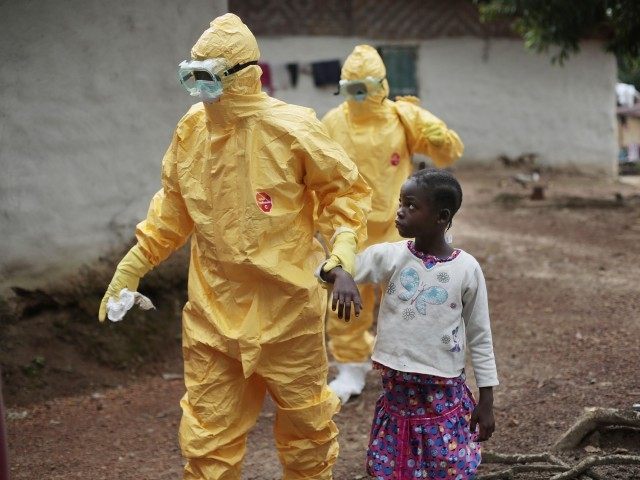The government of Guinea confirmed Wednesday that five people had died after contracting the Ebola virus in the southern border state of Macenta, prompting a closing of the border and a manhunt for hundreds of villagers suspected of having had contact with the virus.
“We have ordered the border with Guinea closed with immediate effect. The border will remain closed until the situation in Guinea improves,” Liberia’s Information Minister Lenn Eugene Nagbe told Reuters on Tuesday, after seven cases of Ebola in Guinea had been confirmed.
Liberia – which lost nearly 5,000 people during the Ebola outbreak that began in February 2014 – was “not taking any chance at all,” Nagbe affirmed.
The government of Senegal has announced it, too, will close its border. Senegal recorded only one case of Ebola during the 2014-2015 outbreak and vowed to use “the same measures previously taken” to keep the number low.
Authorities in Guinea, meanwhile, are working to contain the outbreak and discover its source. The first two victims of the disease were a couple in Korokpara, a village in southern Macenta. They spread the disease to their relatives. The fifth person to die has been identified as a man who had “been in direct contact” with the dead Ebola patients during a visit, but died about 125 miles from the village. Two other unidentified patients have been diagnosed with Ebola in Guinea. It is not believed that these patients contracted Ebola from the same source as those affected in the previous outbreak.
The government is now working to identify and quarantine individuals who have definitely come into contact with the Ebola patients. Officials tell Reuters they have identified 816 people who potentially carry Ebola, but finding them and quarantining them will be difficult. “When the villagers realized that the test conducted by our health teams on the man were positive, they all fled into the bush,” an official told Reuters of Makoidou, the village in which the fifth patient died.
Local news outlet Guinee News cites authorities as recounting the last days of the man, who has not been identified, as he went from village to village seeking treatment for Ebola. He first went to Balan village and then went to a second unnamed village, “where he spent the night before returning in contact with a healer.” Dissatisfied, he found another healer willing to take his case in Maikodou, where he died.
Macenta health director Dr. Mamadou Diallo, who tells this story, notes that hundreds of those identified as suspected Ebola cases are in hiding. “Today, according to Dr. Diallo, the main difficulty of the prefectural coordination of response is due to the fact that the village where the death took place is deserted, and several high-risk contacts are on the run without a trace at the moment,” Guinee News notes.
During the initial stages of the 2014-2015 outbreak, distrust of medical officials and general denial that Ebola existed significantly hurt the containment of the virus, particularly in Guinea. Villagers often fled when seeing ambulances arrive and hid their relatives known to carry Ebola, contracting the virus in the process. Some villagers attacked doctors and Western volunteers who entered their neighborhoods, accusing them of intentionally spreading Ebola.
The medical outlet International SOS claimed that “over 950 contacts” are being investigated, a higher number than Reuters cites. Local outlet Le Jour Guinee reports that authorities are expected to quarantine all the Kporopara region and monitor “961 contacts distributed among 181 families.”
National authorities in Guinea are urging calm. “Liberia has handled the situation; Sierra Leone just handled their cases – it will not be Guinea that cannot handle its cases. We must not be swayed by emotion,” Dr. Sakoba Keita, national coordinator of the Fight Against Ebola in Guinea, told reporters Wednesday. He estimated Ebola would be eradicated once again in the country by mid-April.

COMMENTS
Please let us know if you're having issues with commenting.